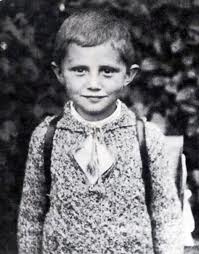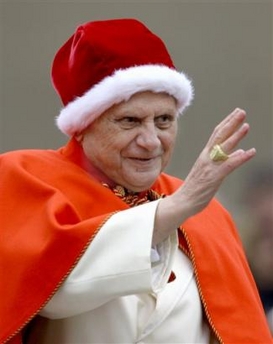Today, December 17th, we enter what the Church calls the Octave (eight days) before Christmas. Our Lord’s arrival at Christmas draws ever near!
In this special time of preparation before Christmas, there are some special liturgical happenings that only occur in this week before we celebrate the birth of Our Lord. For example, starting today, the Evening Prayer of the Church, often called Vespers, contains seven beautiful Antiphons that are prayed before reciting the Canticle of the Blessed Virgin Mary, which is a part of evening prayer.
Let’s back up a bit . . . what is Vespers? Vespers, or Evening Prayer in the Liturgy of the Hours, is a series of psalms and readings from Scripture that are prayed by priests, religious brothers and sisters, and even laypeople throughout the world every evening.
So, basically, these antiphons (often referred to as the “O Antiphons”, because they all begin with “O”) are short sentences (prayers, really) that are recited or sometimes sung before and after praying the Canticle of the Blessed Virgin Mary. Each of the Antiphons calls to mind a title given to the Messiah in the Old Testament. These small, short prayers are a beautiful way to pray particularly for our Lord’s coming.
The O Antiphons are as follows:
- December 17: O Sapientia (O Wisdom)
- December 18: O Adonai (O Lord)
- December 19: O Radix Jesse (O Root of Jesse)
- December 20: O Clavis David (O Key of David)
- December 21: O Oriens (O Dayspring)
- December 22: O Rex Gentium (O King of the Nations)
- December 23: O Emmanuel (O With us is God)
Below are the antiphons in their entirety in English, along with the verses from Scripture that they reference. Consider using these beautiful, small prayers as a way to prepare in a special way for our Lord’s coming in this last week of Advent!
December 17 – O Wisdom, O holy Word of God, you govern all creation with your strong yet tender care. Come and show your people the way to salvation (Isaiah 11:2).
December 18 – O sacred Lord of ancient Israel, who showed yourself to Moses in the burning bush, who gave him the holy law on Sinai mountain: come, stretch out your mighty hand to set us free (Isaiah 11:4, 33:22).
December 19 – O Flower of Jesse’s stem, you have been raised up as a sign for all peoples; kings stand silent in your presence; the nations bow down in worship before you. Come, let nothing keep you from coming to our aid (Isaiah 11:1, 11:10).
December 20 – O Key of David, O royal power of Israel controlling at your will the gate of heaven: come, break down the prison walls of death for those who dwell in darkness and the shadow of death; and lead your captive people into freedom (Isaiah 22:22).
December 21 – O Radiant Dawn, splendor of eternal light, sun of justice: come, shine on those who dwell in darkness and the shadow of death (Isaiah 9:20).
December 22 – O King of all the nations, the only joy of every human heart; O keystone of the mighty arch of man, come and save the creature you fashioned from the dust (Isaiah 2:4, 9:7).
December 23 – O Emmanuel, king and lawgiver, desire of the nations, Savior of all people, come and set us free, Lord our God (Isaiah 7:14).
Some final notes:
If you take the first letter of the Latin titles of the Messiah (Sapientia, Adonai, Radix Jesse, Clavis David, Oriens, Rex Gentium, Emmanuel), and spell them out in reverse order, the Latin words ERO CRAS are formed.
What do you suppose ERO CRAS means?
Also, the next time you sing “O Come, O Come, Emmanuel”, pay particular attention to the verses. They are a version of the O Antiphons!
For more information on the O Antiphons:
May this final week before Christmas be for you a time of great anticipation and joy!


